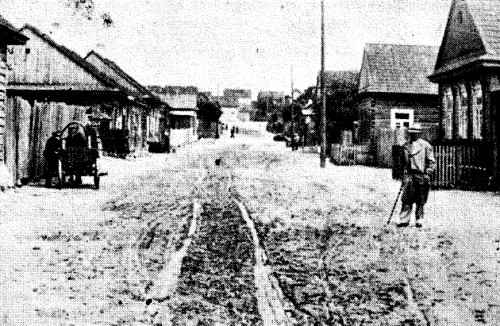 |
|
|
[Page 264]
by Aharon Chayat, New York
Translated by Esther Libby Raichman
|
My destroyed little town – a gravestone My fellow-townsfolk – a gift.
I long for you, my dear, old home,
Sweet shtetl of mine! Stands before me, in all its charm,
Here, you stretch idyllically along the Niemen River,
And here is my little house, where my grandmother rocked me, |
[Page 265]
|
|
| Paromneh Street |
|
Here again, I hear my mother's tender voice, And at twilight on the Sabbath, it drips like evening dew, “G-d of Abraham” – murmurs the chaste woman's virtuous mouth, As she looks for the “three stars”[2] deep in the blue heavens.
And here, the old cheder[3], source of my inspiration,
My dear, beloved shtetl, my dream that is so real,
Little means of sustenance, scant, rewards small and weak,
The Rabbi, Reb Yehoshua, the “purest of olive oil”,
Reb Moshe from Zabludowa, for the ordinary women folk,
Reb Eliyahu, the oldest shochet,[8] a Jew as sweet as sugar,
Reb Shlomo a shochet, a very good-natured Jew,
Reb Yosef a chassid, a dear, and quiet, Jew,
Reb Meir'ke the “ginger”, you remember him, the “eccentric”?
And Dovid, Chasha Leah's son, zealot, pioneer,
The ”teacher Alter”, loyal veteran of Zion,
And who among you does not remember Mottele Machtey,
Do you recall the young man from Bialystok, the elegant one,
Reb Shaul of the bathhouse, our Carlsbad[14] fount,
Zlatte Minye's daughters, until they had truly grey braids,
Chantshe's daughters in the “shop queues,” door by door, |
[Page 266]
|
|
| Avraham Sadovsky |
|
Avrem'el Ful-Ful, the “newspaper seller,” the people's carrier of culture, Would say the morning prayers until midday, with ardor and zeal, Then run to the train station for newspapers, without order or system, And arrive in the evening with “half-baked news”.
And if on the “ferry”, you hear a clamor,
Chashe Bryne's son Shmuel, with many medals bedecked,
Reb Lippo Dorsky, a fine Jew, with G-d in his heart,
In the community small prayer house, in the evening a tumult, an uproar,
Peshe Riva's son Mordechai Fyvel, a Jew with feeling.
Yosef the painter, strove day, and night, |
|
|
First row, seated from right: Dr. Aharon Levin, two Christians Second row, standing from right: unknown, Dr. Yitzchak Epshtein, Sonye Kantorovitsh, Adv. Aharon Chait, Sonye Volfson, Yoel Lusterman, Dr. Ya'akov Akselrod |
[Page 267]
|
The old reb Yedidyah, a shoemaker by trade, Made a living from the shoemaker's thread and awl, Whenever an anxiety, or a misfortune stood watch, This kind person supported and helped countless souls.
Tanna, Eli Shaul's son, the most influential man in town,
Leibe, Esther's son, the Burial Society's leader
Avraham the quilter, served devotedly at the pulpit,
The “women's committee”, the mothers of the town,
My dear birthplace, with Jews of illustrious birth,
Your youth, woven from the threads of the shtetl,
Livelihood? Trade? Heavy industry? |
|
|
Above: Women's Society 1926 Bottom: orphan committee in Stolpce Women's names in bottom row from right: Rubin, the Rabbi's wife Mrs. Lieberman, Neifeld, R. Vinereich |
[Page 268]
|
Achievements? Hotel “Europa”, with Elkayim, the owner, Two people barely able to push their way through the door, A bitter irony, a mockery , fleeting, Alas, a “continent” of cubits[22] four-by-four.
A community lived there idyllically,
Until … like bandits from the deepest forest,
Like Samson against the Philistines, young and old,
From the deserted ghetto, dipped in fiery passion,
Now it is quiet there, everything went up in smoke,
Although I am far from you, wandering in a strange land,
My mourning has no boundary, no grounds,
The years pass by, but my mood is forlorn,
By the flickering glow of the yahrzeit candle, |
Translator's Footnotes:
|
|
JewishGen, Inc. makes no representations regarding the accuracy of
the translation. The reader may wish to refer to the original material
for verification.
JewishGen is not responsible for inaccuracies or omissions in the original work and cannot rewrite or edit the text to correct inaccuracies and/or omissions.
Our mission is to produce a translation of the original work and we cannot verify the accuracy of statements or alter facts cited.
 Stowbtsy, Belarus
Stowbtsy, Belarus
 Yizkor Book Project
Yizkor Book Project
 JewishGen Home Page
JewishGen Home Page
Copyright © 1999-2024 by JewishGen, Inc.
Updated 29 Feb 2024 by JH